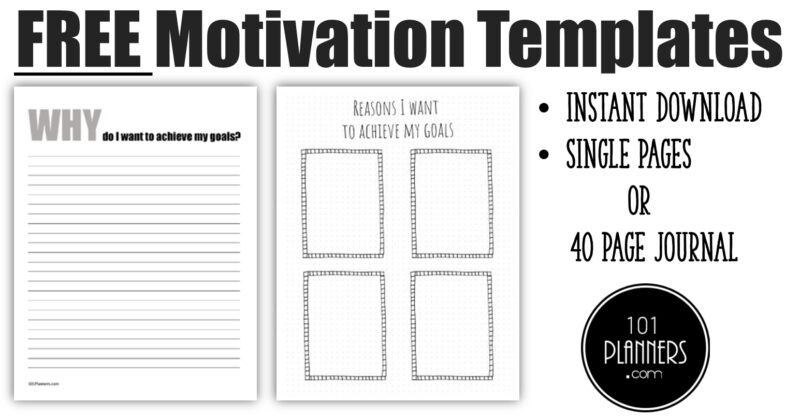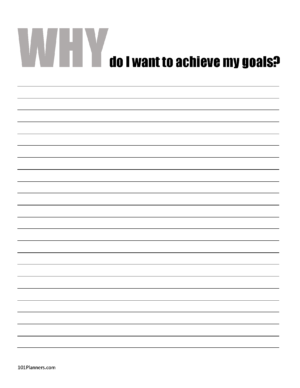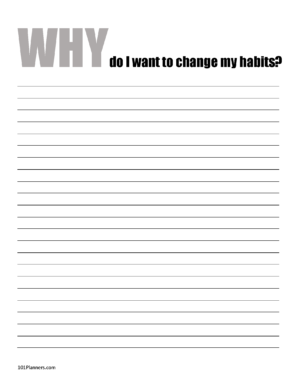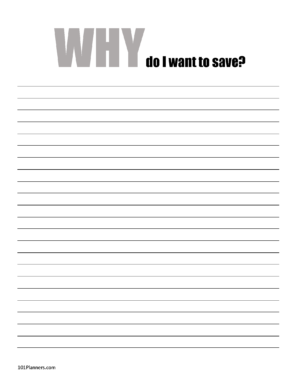Free motivation journal to help you reach your goals no matter what they are. We also offer motivation journal prompts that you can download on a journal page.

What Motivation Is
Motivation is an internal drive that compels an individual to act in a certain way towards a desired goal. It can be seen as the reason for a person’s actions, desires, and needs. Motivation can come from a variety of sources, including personal interest, rewards, recognition, or even personal challenges. It is a complex psychological construct that plays a crucial role in shaping a person’s behavior and determining their level of engagement in various activities.
Motivation Tips
- Set clear and achievable goals: having a clear vision of what you want to accomplish can provide direction and purpose. See goal planner.
- Break goals into smaller tasks: breaking down larger goals into smaller, manageable steps can make them less overwhelming and easier to achieve. See action items.
- Celebrate progress and successes: recognizing your progress and celebrating your successes can keep you motivated and build confidence. See goal tracker.
- Surround yourself with positive people: being around positive and supportive people can help you stay motivated and encouraged.
- Find your WHY: understanding the purpose behind your goals can help you stay motivated and focused, even during challenges. See the why template below or the 5 whys template.
- Stay organized: having a clear and organized plan can help you stay on track and avoid feeling overwhelmed. Use planners to stay organized.
- Take care of yourself: maintaining good physical and mental health can improve your motivation and overall well-being. See personal development.
- Keep things in perspective: sometimes things don’t go as planned, but it’s important to keep a positive outlook and not get discouraged by setbacks.
- Reframe challenges as opportunities: viewing challenges as opportunities to learn and grow can help you stay motivated and see the positive in difficult situations. See when life gives you lemons.
- Reward yourself: recognizing your hard work and accomplishments with rewards can provide a boost of motivation and a sense of satisfaction. For example, see weight loss rewards.
Motivation Template
We offer a free motivational journal with 40 pages that will help you set and reach goals and keep you motivated (see below). However, if you only want to focus on your WHY then the following templates will help you. Please note that when you discuss your WHY it is important to get to the root cause. See the 5 whys template that will help you get to the root cause.
What is a Motivation Journal
A motivation journal is a type of personal journal that is used to track and increase an individual’s motivation levels. It typically includes daily entries in which the individual reflects on their goals, writes down what they are grateful for, and identifies any challenges or obstacles that may be impacting their motivation.
The purpose of a motivation journal is to help you stay focused on your goals and to increase your motivation levels over time. By reflecting on their progress, writing down their goals, and tracking their feelings and thoughts, you can gain a clearer understanding of what motivates you and what obstacles may be holding you back. This can help you to identify strategies for increasing their motivation levels and to make positive changes in their lives.
A motivation journal can be a valuable tool for anyone looking to improve their motivation and to achieve their goals. By reflecting on your progress and writing down your thoughts and feelings, you can gain a deeper understanding of what drives you and what you need to do to stay motivated.
There are also six motivational goal quotes throughout the printable planner to keep you motivated.
The Importance of Motivation to Achieve Your Goals
Motivation is essential for reaching one’s goals because it provides the drive, energy, and direction needed to pursue them effectively. Without motivation, it can be difficult to stay focused, overcome obstacles, and persist in the face of challenges. Some specific reasons why motivation is important for reaching goals include:
- Provides direction and focus: Motivation helps individuals to stay focused on their goals, and to prioritize their efforts and resources accordingly.
- Overcomes obstacles: Pursuing goals often involves facing obstacles and challenges. Motivation provides the drive and determination needed to overcome these obstacles and keep moving forward.
- Maintains persistence: Staying committed to a goal over the long term requires persistence and discipline. Motivation helps individuals to stay focused and to persist in the face of setbacks or distractions.
- Increases productivity: People who are motivated are often more productive, as they are focused on the task at hand and less likely to waste time or energy on distractions.
- Improves decision-making: Individuals who are motivated are better equipped to make decisions, as they have a clear sense of what they want to achieve and how to get there.
- Fosters positive habits: Motivation can help individuals develop positive habits and behaviors, such as persistence, self-discipline, and a growth mindset, which are key to success in life.
In summary, motivation is crucial for reaching one’s goals, as it provides the drive, focus, and determination needed to succeed. By staying motivated and committed to their goals, individuals are more likely to achieve their desired outcomes and lead fulfilling and successful lives.
See Weight Loss Motivation Tips and exercise motivation.
Factors for Motivation
There are many factors that can influence an individual’s motivation, including:
- Personal Interest: People are often motivated by activities and goals that they find personally meaningful or enjoyable.
- Rewards and Recognition: The promise of a reward or recognition can be a powerful motivator for some individuals.
- Challenging Goals: Setting challenging goals can increase motivation, as individuals feel a sense of accomplishment when they meet those goals.
- Autonomy: The feeling of having control over one’s own work and the ability to make decisions can increase motivation.
- Social Support: The support of friends, family, and co-workers can provide motivation and help individuals overcome obstacles.
- Feedback: Receiving feedback on one’s performance can help individuals understand their strengths and weaknesses, and can motivate them to improve.
- Meaning and Purpose: People are often motivated by a sense of purpose and meaning in their work, and the knowledge that their efforts are making a positive impact.
These are just a few examples of the many factors that can influence motivation. The specific motivators that are most important to an individual can vary depending on their personality, values, and life experiences. Understanding one’s own motivations can be helpful in setting goals and making decisions about how to best allocate time and energy.
Motivation vs Discipline
Motivation and discipline are two related yet distinct concepts that play important roles in shaping an individual’s behavior and outcomes.
- Motivation refers to an internal drive or desire to pursue a goal or engage in an activity. It is the force that propels a person to take action and is often driven by personal interests, rewards, recognition, or other factors.
- Discipline, on the other hand, is the ability to control one’s behavior and regulate one’s actions in pursuit of a goal. It involves putting in the effort and focus required to achieve a desired outcome, even in the face of distractions or setbacks. Discipline requires a strong sense of self-control, determination, and persistence, and is often what separates successful individuals from those who struggle to reach their goals.
In summary, motivation is the reason for taking action, while discipline is the ability to stick to a plan and make progress towards a goal. Both play important roles in personal and professional success, and often work together to help individuals achieve their desired outcomes.
Motivation vs Inspiration
Motivation and inspiration are related but distinct concepts.
- Motivation refers to the drive and energy that drives a person to pursue their goals. It is often thought of as an internal force that pushes a person to take action and make progress towards their desired outcomes.
- Inspiration, on the other hand, refers to the stimulation of the mind and emotions that leads to creative ideas and artistic expression. Inspiration can come from within or from external sources, such as a beautiful sunset, a piece of music, or an inspiring person. Inspiration often leads to increased motivation and creativity.
In summary, motivation is the force that drives a person to take action and pursue their goals, while inspiration is the stimulation of the mind and emotions that leads to creative ideas and artistic expression. Both are important for personal growth and success, and often work together to help individuals achieve their desired outcomes.
Motivation Theory
Motivation theory refers to the study of the psychological and sociological processes that drive individuals to behave in a certain way. There are several theories of motivation that attempt to explain why and how people are motivated, including:
- Maslow’s Hierarchy of Needs: This theory states that individuals have basic needs that must be satisfied before they can move on to higher-level needs, such as self-actualization. Maslow’s Hierarchy of Needs is a theory in psychology proposed by Abraham Maslow in 1943, that describes the different levels of human needs, arranged in a pyramid-like structure. The five levels, starting from the bottom up, are physiological needs, safety needs, love and belonging, esteem, and self-actualization. The idea is that lower level needs must be satisfied before higher level needs become a priority.
- Herzberg’s Two-Factor Theory: This theory argues that motivation is driven by two types of factors: hygiene factors, such as salary and working conditions, and motivators, such as recognition and achievement. Herzberg’s Two-Factor Theory, also known as the Motivation-Hygiene theory, is a model of job satisfaction and motivation in the workplace. The theory was developed by psychologist Frederick Herzberg in the 1950s. It posits that there are two types of factors that influence employee motivation and job satisfaction: Hygiene factors and motivators. Hygiene factors, such as salary, job security, and working conditions, must be present to avoid dissatisfaction, but do not necessarily lead to motivation. Motivators, such as recognition, growth opportunities, and sense of accomplishment, are the factors that drive employee satisfaction and motivation. According to Herzberg, organizations must address both hygiene and motivator factors to create a work environment that promotes job satisfaction and motivation.
- Self-Determination Theory: This theory suggests that individuals are motivated by three innate psychological needs: autonomy, competence, and relatedness. Self-Determination Theory (SDT) is a theory of human motivation and personality that emphasizes the role of intrinsic and extrinsic factors in promoting the fulfillment of innate psychological needs for autonomy, competence, and relatedness. SDT posits that people are more likely to engage in and persist with activities that align with their personal values and interests, and that support their sense of autonomy, competence, and relatedness. It suggests that increasing the level of satisfaction of these psychological needs leads to greater well-being and personal growth. SDT has been applied to various areas including education, health and wellness, and organizational behavior, and is widely recognized as a comprehensive framework for understanding human motivation and behavior.
- Expectancy Theory: This theory posits that individuals are motivated by their belief that their effort will lead to a desired outcome, and that this outcome is valuable to them. Expectancy Theory is a motivational theory that explains how an individual’s efforts are influenced by their expectations of the outcomes of those efforts. The theory was developed by Victor Vroom in the 1960s and posits that an individual’s behavior is influenced by three key perceptions: expectancy, instrumentality, and valence.Expectancy refers to the belief that increased effort will lead to improved performance. Instrumentality refers to the belief that improved performance will lead to specific outcomes, such as rewards or recognition. Valence refers to the value an individual places on the outcome and the degree to which it is desired. According to Expectancy Theory, an individual’s motivation to perform is determined by the strength of their beliefs that their effort will lead to improved performance, which will in turn lead to valued outcomes. Expectancy Theory suggests that individuals are motivated to the extent that they believe their effort will lead to improved performance and that improved performance will lead to valued outcomes.
- Self-Efficacy Theory: This theory states that an individual’s belief in their ability to perform a task is a major determinant of their motivation to do so. Self-Efficacy Theory is a social cognitive theory that focuses on an individual’s belief in their ability to perform a specific task or behavior. It was developed by Albert Bandura and posits that a person’s self-efficacy, or belief in their ability to perform a task, is a strong predictor of their behavior and performance.Self-efficacy is influenced by four sources of information: past performance, vicarious experience, emotional and physiological states, and social persuasion. According to the theory, an individual’s self-efficacy can increase through successful experiences, observing others perform successfully, receiving encouragement and support, and through direct experience. Self-Efficacy Theory suggests that individuals with high self-efficacy are more likely to take on challenging tasks, persist in the face of difficulties, and recover more quickly from setbacks, compared to those with low self-efficacy. The theory has been applied in a variety of domains, including education, health, and organizational behavior, and has been found to be a strong predictor of academic and work-related performance.
These are just a few examples of the many theories of motivation that exist. The choice of which theory to use often depends on the context and the specific motivations being studied.






 My name is
My name is